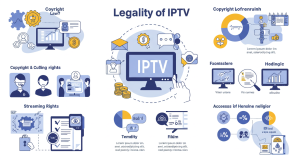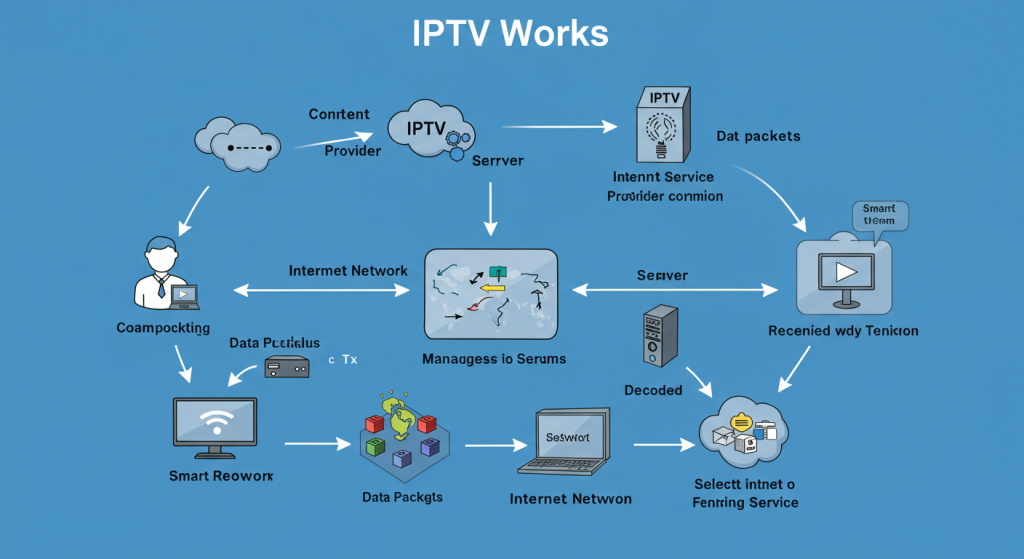How Does IPTV Work
With the rise of digital streaming, IPTV has become a buzzword in the world of home entertainment. But what exactly is IPTV, and how does iptv work? If you’re curious about cutting the cord and switching to a more flexible, internet-based TV system, this article will break down the key aspects in simple terms.

What is IPTV?
IPTV stands for Internet Protocol Television, a system where television services are delivered using the internet rather than traditional methods like satellite or cable. Unlike cable which broadcasts everything at once, IPTV streams content on-demand through a secure internet connection.
This means that IPTV allows you to watch live TV, on-demand videos, and recorded shows, all streamed through your internet.
How Does IPTV Actually Work?
IPTV works by sending video content in small packets of data through your internet connection. This process involves three main components:
- Content Source: The provider captures live TV or video content.
- IPTV Server: The content is encoded and stored or transmitted live.
- User Interface (UI): You access it through an app, smart TV, set-top box, or computer.
When you select a show or channel, a request is sent to the IPTV server, which then streams the content to your device in real-time. This is similar to how Netflix or YouTube works, but IPTV includes live TV and scheduled programming too.

Types of IPTV Services
There are several types of IPTV services you can use:
- Live TV: Watch real-time broadcasts, just like cable or satellite.
- Video on Demand (VOD): Choose movies or shows to watch at your convenience.
- Time-Shifted TV: Replay content that aired earlier, often within a specific window (like 7-day catch-up).
Each type offers different flexibility depending on your needs and preferences.
IPTV vs Traditional TV: What’s the Difference?
Traditional TV services use satellite or cable connections, which limit where and when you can watch. IPTV, on the other hand, uses the internet, which opens up several advantages:
| Feature | IPTV | Traditional TV |
| Flexibility | Watch on any device | Mostly limited to TV |
| Content Access | On-demand + live | Fixed schedule |
| Internet Requirement | Yes | No |
| Device Compatibility | Smart TVs, phones, tablets | Mostly TV only |
So, IPTV gives you greater control, mobility, and content variety.
What Equipment Do You Need?
Getting started with IPTV is simple. You typically need:
- A high-speed internet connection (minimum 10 Mbps recommended)
- A device such as:
- Smart TV
- Streaming box (like Android TV, MAG box)
- Smartphone or tablet
- PC or laptop
- An IPTV subscription (from a legal and reliable provider)
- Sometimes, an IPTV app or player such as IPTV Smarters or TiviMate
Once these are set up, you simply log in and start streaming.

Is IPTV Legal?
This is an important question. IPTV itself is completely legal many telecom companies and broadcasters use IPTV platforms. However, illegal IPTV services that stream premium content (like sports, movies, and pay-per-view events) without proper licensing are not legal.
Always choose licensed IPTV providers to stay on the right side of the law.
Pros and Cons of IPTV
Let’s break down the advantages and drawbacks:
Pros:
- Affordable compared to cable
- Flexible device support
- On-demand access
- More channel variety
- HD and 4K options available
Cons:
- Depends on internet speed and stability
- Some services may not be licensed
- Requires a bit of setup knowledge
IPTV is a powerful and modern alternative to traditional TV that offers unmatched convenience and control over

Your viewing experience. As more people seek flexibility and cost-saving options, IPTV continues to grow in popularity.
Whether you want to stream movies, live sports, or international channels, IPTV is worth exploring just make sure to go with a reliable and legal provider.
If you’re thinking of switching from cable to something smarter, now you understand how IPTV works and what to expect. It’s time to embrace the future of television.

